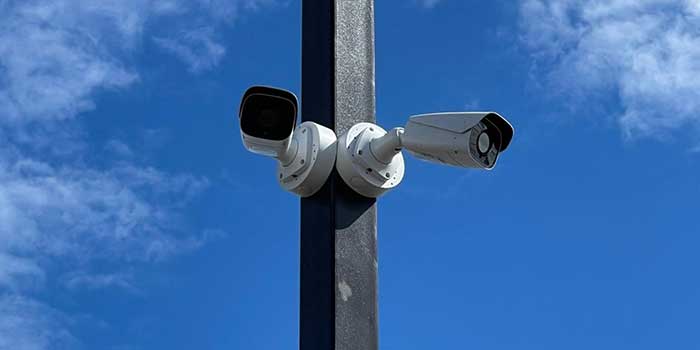Video MGMT System
 Access Control
Access Control
Voice & Data Wiring
 Burglar Alarm
Burglar Alarm
 Fire Alarm
Fire Alarm
Video MGMT System
Voice & Data Wiring
THOUGHT CENTER > Blog > Security Cameras
August 28, 2023
Too busy to read? Here’s a summary:
In the realm of commercial security cameras, resolution is a critical factor that determines the clarity of the images and videos captured. The most common resolutions in the market today are 1080p, 2K, and 4K.
But what do these terms mean, and how do they impact the effectiveness of a security camera?
This blog post will explore these topics and provide a comprehensive comparison of 1080p, 2K, and 4K security cameras.

In simple terms, resolution refers to the number of pixels a display or camera can handle. It's usually represented by the width and height of the image in pixels. The higher the resolution, the more details the camera can capture, resulting in clearer and sharper images.
1080p, also known as Full HD, has a resolution of 1920x1080 pixels.
This means that the camera can capture images with a total of approximately 2.07 million pixels.
1080p security cameras offer clear images that are sufficient for most residential and small business security needs. They’re a popular choice for budget-conscious consumers because they’re more affordable than their higher-resolution counterparts.
2K resolution, also known as Quad HD or QHD, has a resolution of 2560x1440 pixels, totaling approximately 3.68 million pixels.
This is almost double the resolution of 1080p cameras and allows for better identification of faces and license plates.
2K cameras are ideal for medium-sized businesses or residential properties that require clear details in their surveillance footage.
4K, also known as Ultra HD or UHD, boasts a resolution of 3840x2160 pixels, totaling approximately 8.29 million pixels—four times the resolution of 1080p and twice that of 2K.
4K security cameras are perfect for large businesses, public spaces, and properties that require top-notch surveillance.

As the resolution increases from 1080p to 2K to 4K, the image quality improves significantly. This means that 4K cameras capture the most detailed and clear images, followed by 2K, and then 1080p.
With higher resolution comes a higher price tag. 1080p cameras are the most affordable, while 4K cameras are the most expensive.
2K cameras offer a middle ground in terms of cost and performance.
Higher-resolution cameras require more storage space for recorded footage and more bandwidth for streaming. If you opt for a 2K or 4K camera, you should be prepared for the additional storage and bandwidth requirements.
High-resolution cameras can cover larger areas without losing image quality.
This means you may need fewer 4K cameras to cover the same area as 1080p cameras, which can offset the higher cost.
Remember that resolution is just one aspect of a security camera. Aside from resolution, factors like lens quality, sensor size, and software also play a crucial role in the overall performance of the camera.

If you’re ready for an effective security system, reach out to the friendly experts at Mammoth Security. We cover all of Connecticut’s security installation and maintenance needs.
From cameras to alarms to access control to structured cabling, we’ve got your back. Just fill out the form at the bottom of this page, and we’ll reach out to schedule your free, zero-obligation site survey and security consultation.
NOT COMPLETELY SURE?
860-748-4292The difference lies in the resolution or the number of pixels the camera can handle. 1080p has a resolution of 1920x1080 pixels, 2K has a resolution of 2560x1440 pixels, and 4K has a resolution of 3840x2160 pixels.
4K security cameras offer the highest image quality due to their high resolution of 3840x2160 pixels.
Yes, 1080p security cameras offer clear images that are sufficient for most residential security needs.
A 2K security camera provides more detailed images compared to a 1080p camera, making it ideal for medium-sized businesses or residential properties that require greater detail in their surveillance footage.
Higher resolution cameras like 2K and 4K require more storage space for the recorded footage and more bandwidth for streaming.
If you require high-quality surveillance with detailed images, a 4K camera would be the best choice. It can capture minute details, even at a distance.
Generally, with higher resolution comes a higher price tag. 1080p cameras are the most affordable, while 4K cameras are the most expensive.
Resolution refers to the number of pixels that a camera can handle. It's usually represented by the width and height of the image in pixels.
A 4K security camera offers four times the resolution of a 1080p camera, resulting in clearer and more detailed images.
Yes, higher-resolution cameras require more storage space for the recorded footage.
Besides resolution, other factors like lens quality, sensor size, and software also play a crucial role in the overall performance of the camera.
Yes, 4K security cameras are suitable for any business or property that requires top-notch surveillance, including small businesses.
Yes, 1080p security cameras are generally more affordable compared to 2K and 4K cameras.